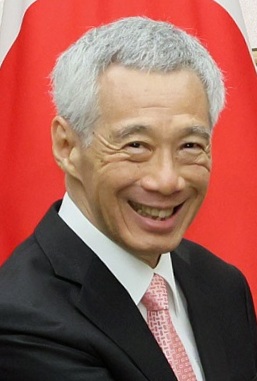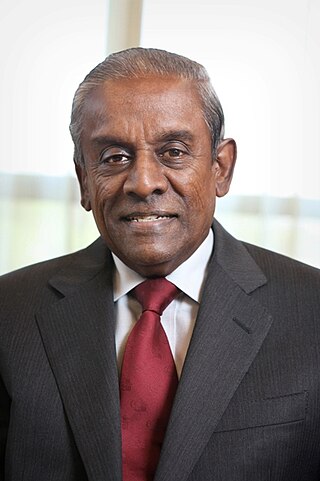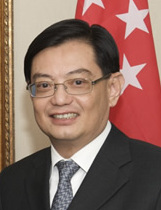The Leader of the Opposition is a title traditionally held by the leader of the largest political party not in government, typical in countries utilizing the parliamentary system form of government. The leader of the opposition is typically seen as an alternative prime minister, premier, first minister, or chief minister to the incumbent; in the Westminster system, they head a rival alternative government known as the shadow cabinet or opposition front bench. The same term is also used to refer to the leader of the largest political party that is not in government in subnational state, provincial, and other regional and local legislatures.

The Colombo Plan is a regional intergovernmental organization that began operations on 1 July 1951. The organization was conceived at an international conference, The Commonwealth Conference on Foreign Affairs held in Colombo, Ceylon in January 1950, and was attended by the finance ministers of Australia, the United Kingdom, Canada, Ceylon, Pakistan and New Zealand, and the prime ministers of Ceylon and India. Membership has expanded significantly over the years to the current 28 governments.
A chief minister is an elected or appointed head of government of – in most instances – a sub-national entity, for instance an administrative subdivision or federal constituent entity. Examples include a state in India; a territory of Australia; a province of Sri Lanka or Pakistan; a federal province in Nepal; an autonomous region of Philippines; or a British Overseas Territory that has attained self-governance. It is also used as the English version of the title given to the heads of governments of the Malay states without a monarchy.

The prime minister of Singapore is the head of government of the Republic of Singapore. The president appoints the prime minister, a Member of Parliament (MP) who in their opinion, is most likely to command the confidence of the majority of MPs. The incumbent prime minister is Lee Hsien Loong, who took office on 12 August 2004.
Prime Minister's Office may refer to:
Deputy minister is a title borne by politicians or officials in certain countries governed under a parliamentary system. A deputy minister is positioned in some way ‘under’ a minister, who is a full member of Cabinet, in charge of a particular standing policy portfolio, and typically oversees an associated civil service department. Depending on the jurisdiction, a "Deputy minister" may be a Cabinet minister who regularly acts as and for a more senior cabinet minister, a junior minister assigned to assist a cabinet minister, an elected member of the governing party or coalition assigned to assist a specific cabinet minister ‘from the back benches’ or a non-elected head of a civil service department taking political direction from a Cabinet minister.

Shunmugam Jayakumar, often known as S. Jayakumar, is a Singaporean former politician, diplomat, lawyer and author who served as Deputy Prime Minister of Singapore between 2004 and 2009. A member of the governing People's Action Party (PAP), he was the Member of Parliament (MP) for Bedok SMC between 1980 and 1988, the Bedok division of Bedok GRC between 1988 and 1997, and later East Coast GRC between 1997 and 2011.
A permanent secretary is the most senior civil servant of a department or ministry charged with running the department or ministry's day-to-day activities. Permanent secretaries are the non-political civil service chief executives of government departments or ministries, who generally hold their position for a number of years at a ministry as distinct from the changing political secretaries of state to whom they report and provide advice.

The Government of Singapore is defined by the Constitution of Singapore to mean the executive branch of the state, the Republic of Singapore, which is made up of the president and the Cabinet. Although the president acts in their personal discretion in the exercise of certain functions as a check on the Cabinet and the Parliament, their role is largely ceremonial. It is the Cabinet, composed of the prime minister and other ministers appointed on their advice by the president, that have the general direction and control of the government. The Cabinet is formed by the political party that gains a simple majority in each general election.

The Cabinet of Singapore forms the executive branch of the Government of Singapore together with the President. It is led by the Prime Minister who is the head of government. The prime minister is a Member of Parliament (MP) appointed by the president who in the president's judgment is likely to command the confidence of the majority of the Members of Parliament (MPs). The other Ministers in the Cabinet are Members of Parliament appointed by the president acting in accordance with the advice of the prime minister. Ministers are prohibited from holding any office of profit and from actively engaging in any commercial enterprise.

The deputy prime minister of Malaysia is the second-highest political office in Malaysia. There have been 15 officeholders since the office was created in 1957. The first prime minister of Malaysia, Tunku Abdul Rahman, started the convention of appointing a deputy prime minister, but some cabinets have opted not to appoint a deputy prime minister.

The deputy prime minister of Singapore is the deputy head of government of the Republic of Singapore. The incumbent deputy prime ministers are Heng Swee Keat and Lawrence Wong, who took office on 1 May 2019 and 13 June 2022 respectively.
The title secretary of state or state's secretary is commonly used for senior or mid-level posts in governments around the world. The role varies between countries, and in some cases there are multiple secretaries of state in the country's system of governing the country.
An interim is a period of temporary pause or change in a sequence of events, or a temporary state, and is often applied to transitional political entities.

Bangsamoro, officially the Bangsamoro Autonomous Region in Muslim Mindanao, is an autonomous region in the Philippines, located in the southwestern portion of the island of Mindanao.

Ahod Balawag Ebrahim, better known as Al-hajj Murad Ebrahim, is a Moro Filipino politician and former rebel leader currently serving as the first chief minister of the Bangsamoro Autonomous Region in Muslim Mindanao.

Senior Minister of Singapore is a position in the Cabinet of Singapore. Holders of this office have served as either the prime minister or the deputy prime minister. Among the executive branch officeholders in the order of precedence, the position ranks after the prime minister and the deputy prime minister. They also serve as part of the Prime Minister's Office and work at The Istana.
Chief Secretary may refer to:

Senior Minister of Malaysia was the second and third highest levels of political office in Malaysia from March 2020 to November 2022. Former Prime Minister Muhyiddin Yassin, started the convention of appointing senior ministers into his cabinet. The convention was maintained in the cabinet of his successor, Ismail Sabri Yaakob. His successor Anwar Ibrahim did not follow and instead appointed two Deputy Prime Ministers in his cabinet and abolished the office of Senior Minister. According to Muhyiddin, the office was to deputise for the Prime Minister, similar to the duties of the Deputy Prime Minister. Muhyiddin also named one of the four former Senior Minister Azmin Ali as the Acting Prime Minister during his absence during his term as the Prime Minister. However, during a brief period from 7 July 2021 to 16 August 2021 for 40 days, both offices coexisted. Muhyiddin promoted Ismail Sabri to the Deputy Prime Minister while promoting Hishammuddin Hussein to replace Ismail Sabri as the Senior Minister and retaining all three other Senior Ministers on 7 July 2021, the coexistence ended after the collapse of the Muhyiddin administration on 16 August 2021 as after Ismail Sabri became the Prime Minister, he did not appoint the Deputy Prime Minister and only appointed Senior Ministers.









